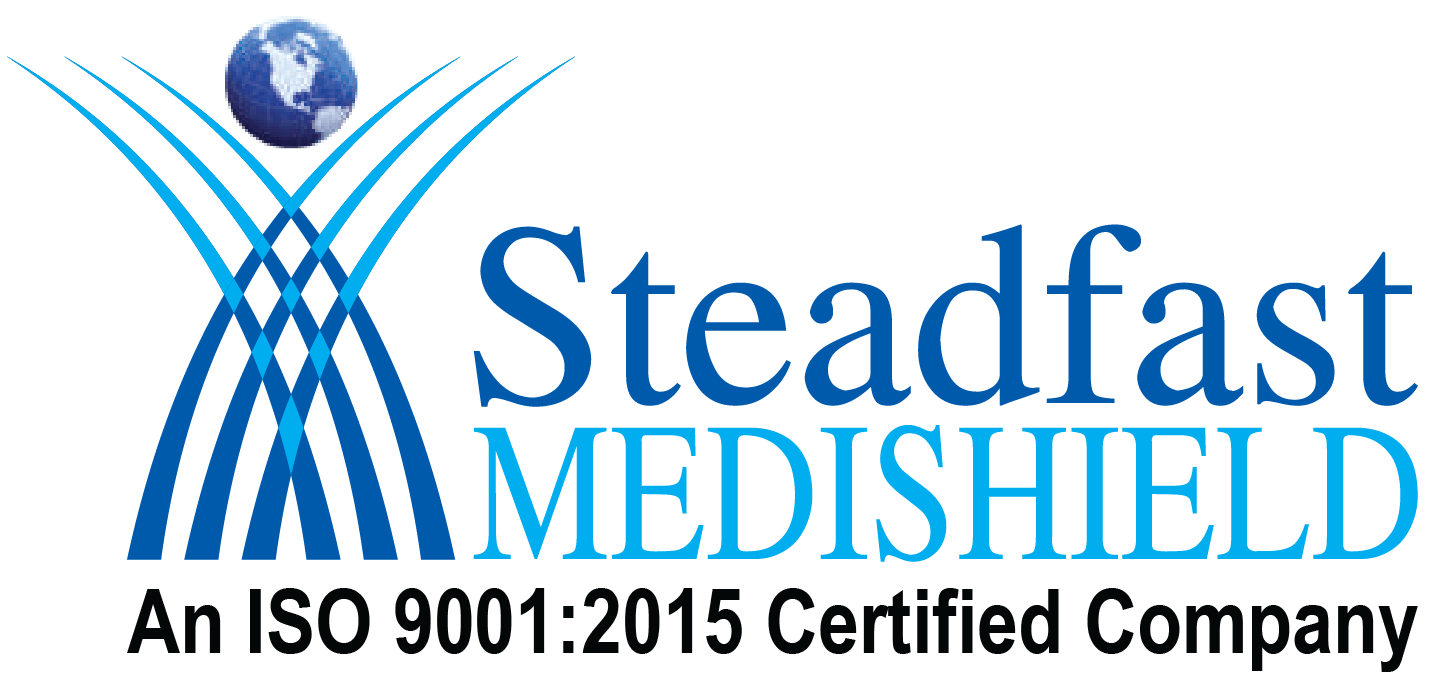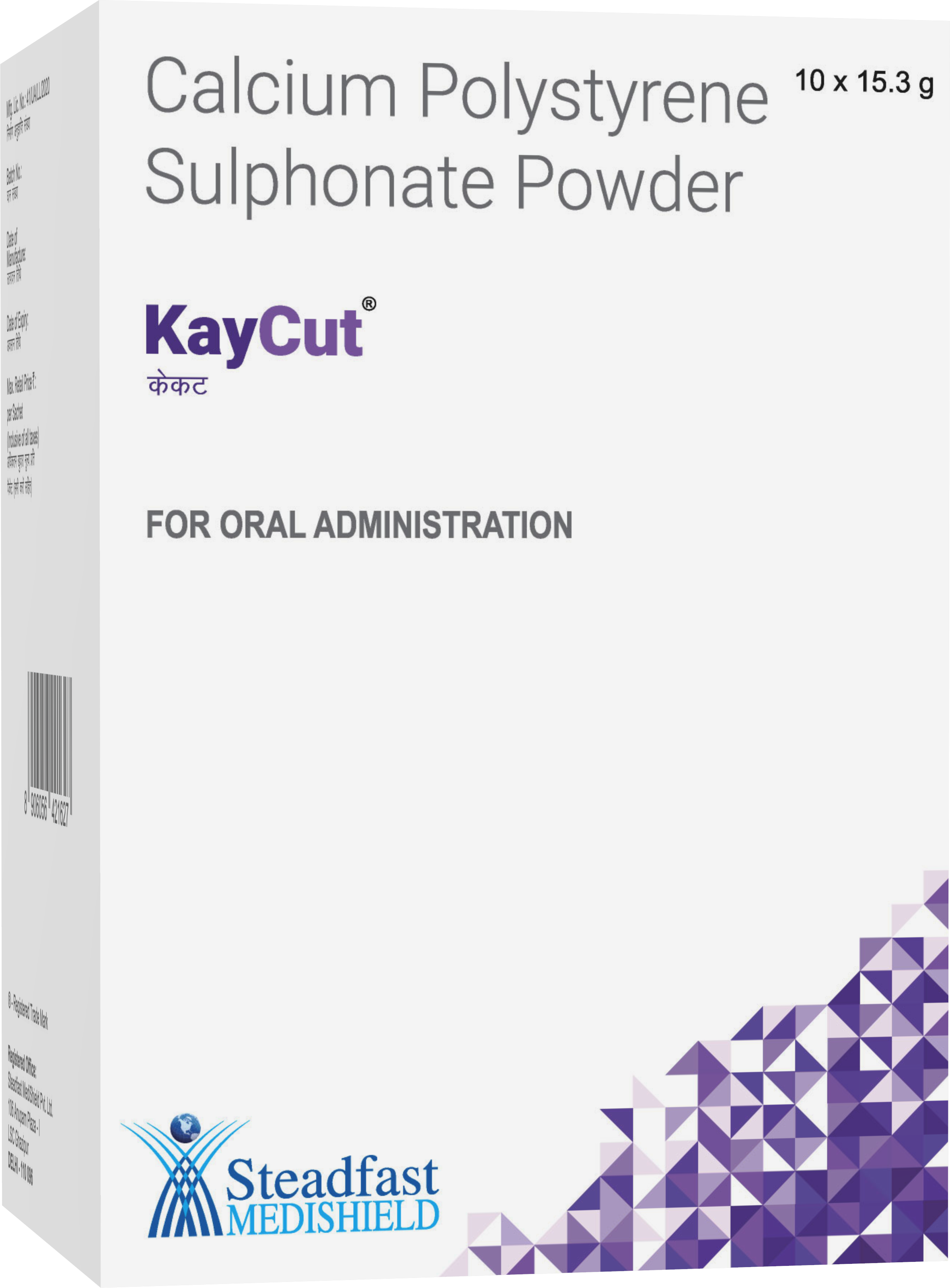Description
KayCut contains Calcium Polystyrene Sulphonate powder. It is orange flavour, odourless powder with a sodium content less than 1 mg/g. The calcium content of KayCut is about 8% w/w (1.6-2.4 mmol/g).
Pharmacodynamics
Calcium Polystyrene Sulphonate is a cation exchange resin prepared in the calcium phase.
Pharmacokinetics
Absorption and Distribution
Calcium Polystyrene Sulphonate is not absorbed from the gastrointestinal tract. Calcium Polystyrene Sulphonate removes potassium from the body by exchanging it within the gut for calcium.
Metabolism and Excretion
For the most part, this action occurs in the large intestine, which excretes potassium to a greater degree than in the small intestine.
The efficiency of potassium exchange is unpredictable and variable. The resin is not selective for potassium.
Indications
- For the treatment of hyperkalemia associated with anuria and severe oliguria.
- For the treatment of hyperkalemia in patients requiring dialysis and in patients on regular haemodialysis or on prolonged peritoneal dialysis.
- For the treatment of hyperkalemia associated with use of RAASi,NSAIDs and Potassium sparing diuretics.
Interactions With Other Medicines
Concomitant use of sorbitol with Calcium Polystyrene Sulphonate is not recommended due to cases of intestinal necrosis and other serious gastrointestinal adverse reactions, which may be fatal.
Cation donating agents may reduce the potassium binding effectiveness of KayCut.
Non-absorbable cation containing antacids and laxatives (such as magnesium hydroxide) and concomitant oral use of cation exchange resins has been reported to cause systemic alkalosis.
Aluminium Hydroxide: Intestinal obstruction due to concretions of aluminium hydroxide has been reported when taken in combination with the resin (sodium form).
Digoxin: The toxic effects of digoxin on the heart, especially ventricular arrhythmias and AV nodal depression, are likely to be exaggerated if hypokalaemia and/or hypercalcaemia develop.
Lithium: Possible decreases of lithium absorption.
Thyroxine: Possible decreases of thyroxine absorption.
Contraindications
KayCut is contraindicated in patients having:
- A history of hypersensitivity to polystyrene sulphonate resins
- Serum potassium levels less than 5 mmol/L
- Conditions associated with hypercalcaemia (eg. hyperparathyroidism, multiple myeloma,
sarcoidosis or metastatic carcinoma)
- Obstructive bowel disease
KayCut should not be administered orally to neonates and is contraindicated in neonates with reduced gut motility (eg. post-operatively or drug induced)
Precautions
The possibility of severe potassium depletion should be considered and adequate clinical and biochemical control is essential during treatment, especially in patients on digoxin. Administration of the resin should be stopped when the serum potassium falls to 5 mmol/litre.
Like all cation-exchange resins, KayCut is not totally selective for potassium in its actions. Serum calcium levels should be estimated at weekly intervals to detect the early development of hypercalcaemia and the dose of resin adjusted to levels at which hypercalcaemia and hypokalaemia are prevented. Hypomagnesaemia may also occur and serum magnesium levels should be monitored. Patients should be monitored for all applicable electrolyte disturbances.
In the event of clinically significant constipation, treatment should be discontinued until normal bowel movement resumes. Magnesium containing laxatives should not be used.
With oral administration, care should be taken to avoid aspiration, which may lead to bronchopulmonary complications.
Gastrointestinal stenosis, intestinal ischaemia and its complications (necrosis and perforation) may occur in patients treated with polystyrene sulphonate, especially in patients using sorbitol. Therefore, concomitant use of sorbitol with calcium polystyrene sulphonate is not recommended.
Since effective lowering of serum potassium with KayCut may take hours to days, treatment with this drug alone may be insufficient to rapidly correct severe hyperkalemia, often associated with states of rapid tissue breakdown, e.g., burns or trauma. In such instances, some form of dialysis may be imperative. If hyperkalemia is marked so as to constitute a medical emergency, immediate treatment with intravenous glucose and insulin or intravenous sodium bicarbonate may be necessary as a temporary measure to lower serum potassium while other long term potassium lowering therapy is being prepared.
Use in Pregnancy (Category B2)
No data is available regarding the use of polystyrene sulphonate resins in pregnancy. The administration of KayCut in pregnancy is not advised unless the potential benefits outweigh any potential risks.
Use in Lactation
No data is available regarding the use of polystyrene sulphonate resins in lactation. The administration of KayCut during breast-feeding, therefore, is not advised unless the potential benefits outweigh any potential risks.
Paediatric Use
In Neonates, KayCut should not be given by the oral route. In Children and Neonates, particular care should be observed with rectal administration, as excessive dosage or inadequate dilution could result in impaction of the resin.
Due to the risk of digestive haemorrhage or colic necrosis, particular care should be observed in premature infants or low birth weight infants.
Adverse Effects
Metabolism and Nutrition Disorders
Cases of hypomagnesemia have been reported. Hypercalcaemia has been reported in well-dialysed patients receiving calcium resin and occasionally in patients with chronic renal failure. Many patients in chronic renal failure have low serum calcium and high serum phosphate, but some, who cannot be screened out beforehand, show a sudden rise in serum calcium to high levels after therapy. The risk emphasizes the need for adequate biochemical control.
Gastrointestinal Disorders
Gastric irritation, anorexia, nausea, vomiting, constipation and occasional diarrhoea may also occur. Fecal impaction following rectal administration has been reported in children and gastrointestinal concretions following oral administration to neonates. Gastrointestinal stenosis and intestinal obstruction have also been reported, possibly due to coexisting pathology, excessive dosage or inadequate dilution of the resin.
Gastrointestinal ischemia, ischemic colitis, gastrointestinal tract ulceration or necrosis, which could lead to intestinal perforation, have been reported following administration of calcium polystyrene sulphonate, which is sometimes fatal.
Respiratory, Thoracic and Mediastinal Disorders
Some cases of acute bronchitis and/or bronchopneumonia associated with inhalation of particles of calcium polystyrene sulphonate have been observed.
Dosage and Administration
KayCut is for oral or rectal administration only. The dosage recommendation should be determined on the basis of regular clinical and serum electrolyte monitoring.
Adults Including the Elderly
Oral
Usual dose of 15 g to be taken three or four times a day. The resin is given by mouth as a suspension in a small amount of water (3-4 mL per gram of resin), or it may be mixed with some sweetened vehicle (but not fruit juices, which contain potassium).
Rectal
In cases where vomiting or upper gastrointestinal problems including paralytic ileus may make oral administration difficult, the resin may be given rectally in a suspension of 30 g resin in 150 mL water or 10% dextrose in water, as a daily retention enema. In the initial stages, administration by this route as well as orally may help to achieve a more rapid lowering of the serum potassium level.
The enema should, if possible, be retained for at least nine hours, following which the colon should be irrigated to remove the resin. If both routes are used at first, it is probably unnecessary to continue rectal administration once the oral resin has reached the rectum.
Children
Oral
Lower doses should be used, as a guide, 1 mmol potassium per gram of resin. The initial dose is 1 g/kg body weight daily in divided doses, in acute hyperkalemia.
Rectal
When the resin cannot be given by mouth, it may be given rectally using a dose at least as great as that which would have been given orally, diluted in the same ratio as described for adults.
Following retention of the enema, the colon should be irrigated to ensure adequate removal of the resin.
Neonates
KayCut should not be given by the oral route and only rectal administration should be considered. With rectal administration, the minimum effective dosage within the range 0.5 g/kg to 1 g/kg should be employed, diluted as for adults and with adequate irrigation to ensure recovery of the resin.
Overdosage
Hypokalemia may manifest clinically by signs of irritability, confusion, delayed thought processes, severe muscle weakness, hyporeflexia or paralysis. ECG abnormalities may be evident and cardiac arrhythmias may occur. In the event of overdosage, appropriate measures should be taken to restore serum potassium levels to normal and to reduce blood calcium levels if these are raised. In addition, consideration should be taken to accelerate the elimination of the resin, particularly if intestinal motility is reduced.
Directions For Use
Disperse the content of the sachet in 50-60 ml of previously boiled and cooled water to form a suspension. It may be mixed with some sweetened vehicle like honey, etc., and should be consumed immediately. Do not mix in fruit juices.
Presentation
15.3 g of powder packed in a sachet, 10 such sachets packed in a carton

